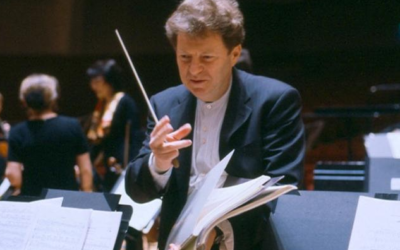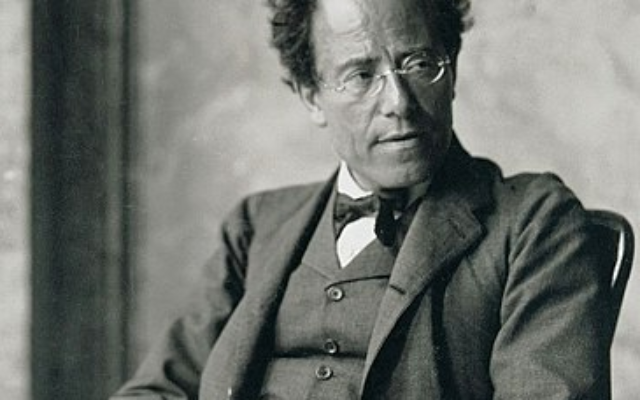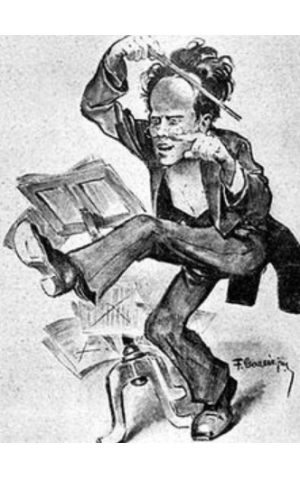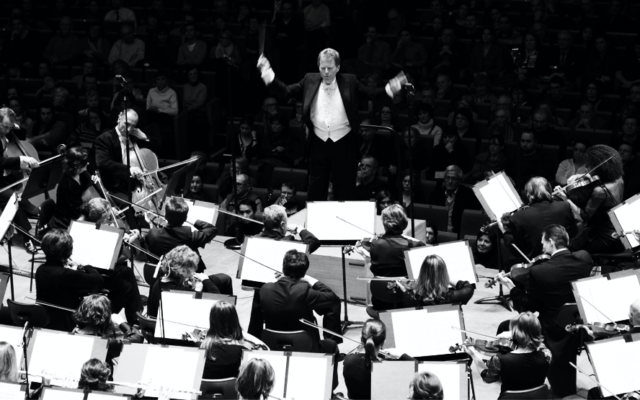Yoel Levi Talks About Art of The Conductor
Four-part series at The Temple features 20th century composers.
Yoel Levi, who over the last 45 years has conducted many of the greatest orchestras of the world, is sharing his insights about The Art of the Conductor in a four-part series this month sponsored by The Temple. It launched Sunday, Dec. 6, with a critical look at the work of Gustav Mahler.
Born to observant Jewish parents in the old Austro-Hungarian Empire, Mahler is considered by many to be one of the important founders of the modern classical musical tradition. In his nine symphonies, Levi believes he embodies some of the most profound ideas ever set to music.
“I want to highlight the greatness of his music, and his unbelievable imagination and complexity of it. And, of course, to help answer the question of how you as a conductor dives in, so to speak, and conduct music like that? How do you immerse in this music emotionally, physically, mentally?”

Levi, who grew up and received his early musical training in Israel, has lived in Atlanta since 1988, when he became music director of the Atlanta Symphony Orchestra. He succeeded the legendary conductor and choral director Robert Shaw. Levi’s 12 years with the orchestra are generally credited with burnishing the reputation of the orchestra around the world.
Among the works he’ll discuss in his first program is Mahler’s Symphony No. 2, the so-called Resurrection Symphony that Mahler began writing when he was only 28. The dramatic work that combines a strong and powerful orchestra score with an equally impressive choral work is, according to Levi, among Mahler’s most impressive works.
“I always said that every piece of Mahler is like a life journey. It’s a life journey that we go through life with all the different good things and bad things, despair, happiness, religious experience, experience of nature. He’s always asking the question: What is the purpose of life? It’s all in his music, and that’s why he’s one of the greatest composers of all time.”

Mahler was the second of 14 children, only six of whom survived infancy, and three more didn’t live to adulthood. He was orphaned by the time he was 20, and yet in his Second Symphony he expresses a strong optimism and the eventual triumph of man over death.
The stirring climax to the work includes Mahler’s own belief in immortality. He has the massed voices behind the large orchestra sing a stirring refrain.

“What perished, rise again,” he has them proclaim, …“O Death, you conqueror of all thing. Now you are conquered.”
The demands such a work places on the conductor during the 1 ½-hour performance is considerable. Levi admits that it can be difficult to remain fully focused on his role of conductor of such a massive work.
“You really forget where you are. You know, the music takes over your mind, your body, your soul. You are on a different planet, you forget where you are, where you came from, you are somewhere else. And it takes quite a while to come back to earth after you finish this piece, let me tell you,“ he said.
Despite his optimism, Mahler, who led a frenetic existence as a conductor on both sides of the Atlantic as well as a composer, died at the age of 51 of heart disease.
“I wish he could have lived another at least 10 years,” Levi said. “He would have written such a large collection of even more unbelievable music.”
When Mahler was asked why he wrote such a small body of work, just nine large symphonic compositions and some songs, he told a close friend and Jewish music critic Max Graf it was because he was too busy making a living, conducting.
“I have time to compose only in summer. During this short holiday, I have to write large works if I want to go down into posterity,” Mahler was quoted in Graf’s 1945 book “Legend of a Musical City: The Story of Vienna.”
In addition to presenting examples of Mahler’s music that he’s recorded in live performance, Levi this month will discuss his recordings by three other modern composers that have left their mark on 20th century music. On successive Sunday evenings, Levi will examine the work of Russian composer and conductor Igor Stravinsky and Americans George Gershwin and Leonard Bernstein. Levi said it’s important to understand not just their ideas, but the feelings they were seeking to convey.
“As a conductor the first thing that you really must have is to be able to feel in your heart the music and to translate what you feel to the orchestra and the audience. What is it that you want to happen in that split of a second when you are creating music?”
The Art of The Conductor: Maestro Yoel Levi in conversation with Bob Bahr continues on Dec. 13, 20 and 27 sponsored by The Temple on Zoom. To register, https://tinyurl.com/y2224kz8.




comments